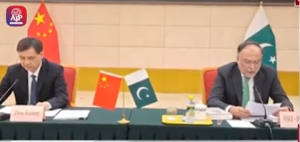Beijing Monitoring Desk
Federal Minister for Planning, Development, and Special Initiatives, Professor Ahsan Iqbal, has stated that the China-Pakistan Economic Corridor (CPEC) is not merely a development project but a symbol of the ironclad friendship between Pakistan and China.
Speaking at the closing session of the 14th Joint Cooperation Committee (JCC) meeting held in Beijing on Friday, the minister highlighted that the JCC meeting reaffirmed the shared vision of both nations and laid down a determined roadmap for CPEC Phase-II. He stressed the need to further strengthen institutional frameworks to ensure the success of Phase-II, building on the foundations laid in Phase-I.
“Security and safety of all CPEC projects and every Chinese national in Pakistan remains our top priority,” said Ahsan Iqbal.
He expressed gratitude to the Chinese hosts and all participants for their insights and commitment, which contributed to the success of the session. According to him, the 14th JCC not only reviewed the progress made so far but also reaffirmed the mutual vision for CPEC and shaped a new direction for the second phase of the corridor.
“This session made it clear that CPEC Phase-II will act as a new engine for growth, partnership, and prosperity,” he added.The minister said both countries have agreed to align the five corridors of Phase-II — development, innovation, green economy, employment, and regional connectivity — with Pakistan’s “5Es” framework (Export, Energy, Environment, Equity, and Empowerment). This synergy, he noted, will transform CPEC into an industrial, technological, sustainable, and inclusive development initiative.
Ahsan Iqbal clarified that this agreement is not just conceptual, but is grounded in the recent consensus achieved during Prime Minister Shehbaz Sharif’s visit to China, where he met with President Xi Jinping and Premier Li Qiang. The areas of cooperation include industrial development, Special Economic Zones, modern agriculture, maritime economy, mining, advanced technology, and major connectivity projects such as ML-1, Karakoram Highway (KKH), and Gwadar Port.
He underscored the importance of the ML-1 railway upgrade and KKH reconstruction, especially in light of upcoming hydropower projects. Timely execution of these initiatives, he said, will deliver significant economic and strategic benefits not only for Pakistan but for the entire region.
To maintain momentum and institutional continuity, Ahsan Iqbal proposed that JCC meetings be held every six months and working group meetings annually over the next three years.
He also stressed the need to counter anti-CPEC propaganda, particularly in the current geopolitical climate, by officially releasing the minutes and consensus of the meeting. He called for a new long-term CPEC plan, aligned with the five corridors and the 5Es framework, to be published within the next 90 days.
Reiterating Pakistan’s commitment to Chinese partners, he said, “Every Chinese guest in Pakistan is as dear to us as every Pakistani citizen.”
“CPEC is not just a developmental agenda; it is the embodiment of our iron brotherhood. We will continue to provide a stable, safe, and enabling environment for this partnership to flourish,” Ahsan Iqbal emphasized.
He concluded with a strong commitment that the next decade of CPEC will witness even greater transformation and prosperity than the last. He proposed that the 15th JCC meeting be held in Islamabad in May 2026, marking the 75th anniversary of Pakistan-China diplomatic relations.


